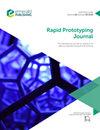多壁碳纳米管和石墨烯纳米片粉末床熔合复合材料的研制与表征
IF 3.6
4区 工程技术
Q1 ENGINEERING, MECHANICAL
引用次数: 0
摘要
随着技术的进步,高性能材料在增材制造市场不断涌现,以满足技术应用的先进要求。在选择性激光烧结(SLS)中,集成导电增强的创新粉末材料作为普通工程热塑性塑料的有前途的替代品,引起了学术界和工业界的极大兴趣。然而,功能材料的实际实施受到成功激光烧结工艺所需的大量条件的限制,这些条件与形貌、粉末尺寸和形状、耐热性、熔体粘度等有关。本研究的目的是探索含有多壁碳纳米管(MWCNT)和石墨烯纳米片(GNP)的聚酰胺12 (PA12)复合材料,旨在了解其在先进SLS应用中的适用性。通过预先优化的机械混合工艺,将PA12-MWCNT和PA12-GNP材料混合在0.50 wt.%和3.00 wt.%之间的不同比例的增强剂中,并通过SLS以适当的体积能量密度进行处理。制作了几个测试样品,并对其加工性,热学,机械,电学和形态学特性进行了表征。最后,对两种碳基材料的性能进行了比较分析。研究结果表明,含有MWCNT的复合材料更容易加工,抗拉强度和抗冲击性更高,但gnp基材料的拉伸弹性模量、抗压强度和微观结构均匀性更高。尽管力学性能下降,但在10 -6 S/cm之前,两种碳溶液都获得了有价值的电导率结果。本研究中开发的碳基复合材料允许将激光烧结部件的适用性扩展到先进领域,包括需要能够保护敏感设备免受静电放电的功能材料的电子相关行业。本文章由计算机程序翻译,如有差异,请以英文原文为准。
Development and characterization of composite materials with multi-walled carbon nanotubes and graphene nanoplatelets for powder bed fusion
Purpose With the technological progress, high-performance materials are emerging in the market of additive manufacturing to comply with the advanced requirements demanded for technical applications. In selective laser sintering (SLS), innovative powder materials integrating conductive reinforcements are attracting much interest within academic and industrial communities as promising alternatives to common engineering thermoplastics. However, the practical implementation of functional materials is limited by the extensive list of conditions required for a successful laser-sintering process, related to the morphology, powder size and shape, heat resistance, melt viscosity and others. The purpose of this study is to explore composite materials of polyamide 12 (PA12) incorporating multi-walled carbon nanotubes (MWCNT) and graphene nanoplatelets (GNP), aiming to understand their suitability for advanced SLS applications. Design/methodology/approach PA12-MWCNT and PA12-GNP materials were blended through a pre-optimized process of mechanical mixing with various percentages of reinforcement between 0.50 wt.% and 3.00 wt.% and processed by SLS with appropriate volume energy density. Several test specimens were produced and characterized with regard to processability, thermal, mechanical, electrical and morphological properties. Finally, a comparative analysis of the performance of both carbon-based materials was performed. Findings The results of this research demonstrated easier processability and higher tensile strength and impact resistance for composites incorporating MWCNT but higher tensile elastic modulus, compressive strength and microstructural homogeneity for GNP-based materials. Despite the decrease in mechanical properties, valuable results of electrical conductivity were obtained with both carbon solutions until 10 –6 S/cm. Originality/value The carbon-based composites developed in this research allow for the expansion of the applicability of laser-sintered parts to advanced fields, including electronics-related industries that require functional materials capable of protecting sensitive devices against electrostatic discharge.
求助全文
通过发布文献求助,成功后即可免费获取论文全文。
去求助
来源期刊

Rapid Prototyping Journal
工程技术-材料科学:综合
CiteScore
8.30
自引率
10.30%
发文量
137
审稿时长
4.6 months
期刊介绍:
Rapid Prototyping Journal concentrates on development in a manufacturing environment but covers applications in other areas, such as medicine and construction. All papers published in this field are scattered over a wide range of international publications, none of which actually specializes in this particular discipline, this journal is a vital resource for anyone involved in additive manufacturing. It draws together important refereed papers on all aspects of AM from distinguished sources all over the world, to give a truly international perspective on this dynamic and exciting area.
-Benchmarking – certification and qualification in AM-
Mass customisation in AM-
Design for AM-
Materials aspects-
Reviews of processes/applications-
CAD and other software aspects-
Enhancement of existing processes-
Integration with design process-
Management implications-
New AM processes-
Novel applications of AM parts-
AM for tooling-
Medical applications-
Reverse engineering in relation to AM-
Additive & Subtractive hybrid manufacturing-
Industrialisation
 求助内容:
求助内容: 应助结果提醒方式:
应助结果提醒方式:


